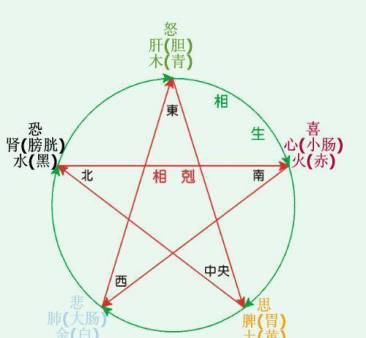"Lovers, those who see things and move also" (Hanshu Dongping'en Wang Yu Biography)
Xu Shen explained in the "Commentaries on the Interpretation of Words" that emotions are "people who have yin qi and desire", and in Chinese medicine theory, when discussing the relationship between mind and body, the relationship between the seven emotions and diseases is emphasized: "People have five viscera and five qi, with joy and anger and sorrow and fear", "Liver qi is weak and afraid, but in fact it is angry", "Anger hurts the liver", "Joy and sadness", "Thinking about hurting the spleen", "worrying about the lungs", "fear of hurting the kidneys" and so on.
Chinese medicine believes that the movement between the five basic substances of wood, fire, earth, metal, and water gives rise to all things in the world. Between these five substances, there is a relationship that is both mutually beneficial and mutually restrictive, and a dynamic balance is maintained in the continuous movement of mutual restraint. Emotions are born in the five viscera, and the five viscera belong to the five elements, so the relationship between the five elements is the same as that of the five elements.

Zhang Congzheng's book "Confucian Affairs, Nine Qi Feeling Diseases are More Compatible and Curative Techniques" will be discussed in detail through the treatment of emotions and spirits: "Sorrow can cure anger, and it can be felt by words of pity and suffering; fear can cure joy, and fear can be feared with words of fear of death; anger can cure thoughts, touched by words of insult and deception; joy can cure sorrow, and entertainment can be entertained by words of ridicule and blasphemy; thinking can cure fear, and it can be taken away by worrying about others and forgetting this."
Joy Therapy Because of worry, thoughts, and depression, the qi machine is blocked, or the qi and blood are not good. And use witty, playful and humorous language, behavior, images, etc., to make the mood joyful, with positive, positive, pleasant, open-minded emotions to alleviate sadness, thinking, bitterness, pessimism and other emotions, to promote yin and yang coordination, qi and blood fluency.
Anger therapy Anger is a bad negative emotion, but the right anger can vent dissatisfaction and relieve stress. Excessive thinking, suffering from gains and losses, uneasiness, or uneasiness can easily lead to pathological damage such as gas knots, stagnation, and blood stasis. Anger can raise yang qi, activate the qi machine, promote the operation of qi and blood, and the appropriate anger response can play a role in forgetting thoughts, going to gains and losses, relieving worries, eliminating depression, suppressing surprises, and invigorating will.
Panic Therapy Emotions of joy are often beneficial for psychosomatic health. The pursuit of comfort and pleasure, disgust and fear, are the common feelings of people. However, excessive joy and great joy are scattered and not hidden, or excessive anxiety is not dissipated. The use of panicked stimulus or threatening language, or alarmist events, to create an atmosphere of panic, can alleviate the stagnation of the qi machine, to achieve the effect of eliminating worry, distraction, and victory over joy.
Sadness therapy Sorrow is a negative emotion, but under certain conditions, sadness can calm impulses, suppress excessive joy, and forget thoughts. Thus, it can be used as a means of restraining certain bad emotions. Sadness is the dissipation of qi, which can alleviate and alleviate the reversal of the gas machine, the reverse of the gas machine, and so on. Sadness is often manifested as loss of will, crying, tears, etc., so that the anger in the chest can be vented, discharged or reduced, thereby reducing psychological pressure, tension, anger, etc., so that the physical symptoms caused by emotional repression and anger can be alleviated or cured.
Thinking is the process and content of thinking and thinking. Telepathy refers to the fact that doctors can use various methods to guide patients to think about related events, or to think carefully, in order to restrict emotional states such as fear, worry, and anxiety, so as to eliminate psychological disorders and physical discomfort. Thinking and thinking is the most important psychological activity of human beings, the content of thinking is the information about objects and events, and the process of thinking is to process the relevant information such as the attributes, movements, states, and characteristics of related objects in order to form knowledge such as concepts, judgments, and propositions, and to solve problems.
Contributed by: Li Yijie, Wangjing Hospital, China Academy of Chinese Medical Sciences
This platform is the official headline number of the Voice of Chinese Medicine of the Chinese Association of Traditional Chinese Medicine, if you want to learn more about the popular science knowledge of Traditional Chinese Medicine, welcome to subscribe to this headline number or pay attention to the official WeChat of the Voice of Chinese Medicine of the Chinese Association of Chinese Medicine (cacmzyzs)